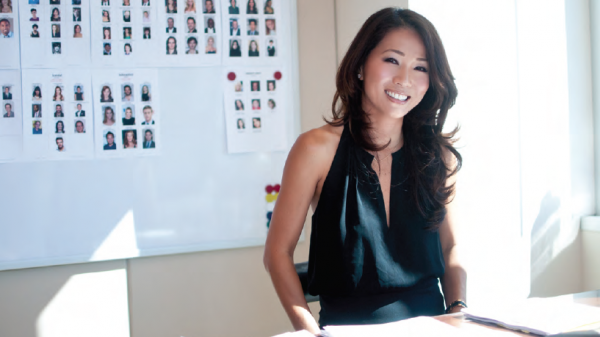Reposted from The GEITF
In the second part of our Q&A with ABC’s Keli Lee, we asked how her casting job works on a day-to-day basis; how she plans to expand her Talent Showcase and whether she can offer any advice to help boost diversity in the UK.
What does the role of executive vice-president casting, ABC, entail?
My role is unusual and unique even in the US in that I manage the casting for the Network and ABC Studios – which produces not only for ABC but for Fox, CBS, cable outlets etc. So the moment there is an idea on the Studio side, we help the producers sell their show, saying, ‘can we attach talent, can we package that show, let’s put together a shortlist’, so that’s on the development side before it’s even pitched to the Network.
On the Network side, any show idea that has an actor attached as a producer or an actor, I’m in those pitches. So the conversation is, ‘ok this person has this idea, is this the right show for ABC and is this the right character for this person?’ And these are the discussions early on before there’s even a script. Of course, we’re the most involved right before we’re greenlighting some of these scripts, and of course, during pilot season.
So you are the person that decides at the end of the day?
It’s completely collaborative. It’s the vision of the creators and who they have in mind, but we ask whether they can write for this person every week – that’s so important. And then there’s the Studio executives and Network executives – it’s a conversation and a collaboration but ultimately if the writer feels this is the person they can really write for and is inspired by, we want to support that decision.
But if you don’t think the lead is going to work?
It’s a negotiation…it really comes down to who is the most passionate.
What’s the biggest challenge in making diversity mainstream?
Comedies are harder because if that comedy writer is writing about a personal experience and that writer grew up in the Midwest, they are writing about what they know. That’s a challenge when it comes to adding diversity, especially if it’s about your childhood. If you think about The Goldbergs which is a really fantastic show, Adam Goldberg is writing about his family and it’s really hard to say: ‘can your sister be somebody else?’
So what advice would you give to people in the UK who might want to introduce a similar Talent Showcase initiative to ABCs?
It’s about passion and commitment and that has to come from the top. I’ve been able to execute these initiatives because Bob Iger {Disney CEO} supports it and Paul Lee {ABC Entertainment President} supports it, so that’s really important.
How do you work with a writer like Shonda Rhimes?
Shonda Rhimes is such an exceptional talent. Having worked with her on Grey’s Anatomy which was her first television show, I can say that she’s a visionary. She’s passionate, she’s thinking about the best talent and she’s just an amazing storyteller.
Research shows that the most under-represented group in the UK on TV are disabled people. What have you done in the US on this?
I would say it’s the same in the US. The showcase programme I talked about is ethnically diverse but it’s also for physically-challenged actors. I don’t think we’re doing enough. We have a long way to go and I feel that’s an area that I want to make the next big push – disabled actors and of course in the US we have an under-represented group of veterans – those are the two groups I want to focus on when the next cycle happens next year.
Audience Q: What do we have to do to incentivise white producers?
2005 was a really big year for us because that was the year we launched Lost, Grey’s Anatomy and Desperate Housewives, three very diverse shows. So if there were any questions around diversity, our response was that our most successful shows on-air are diverse, so do you want to fit in with our shows?
Oona King: I guess you incentivise them by finding the talent, because that’s what we find all the time here, people saying: ‘we don’t get up in the morning and think about how we keep black people off the screens, it’s just that we can’t find them,’ and we have that especially off-screen. Have you done anything specifically off-screen?
We have a writers’ fellowship programme and a directors’ shadowing programme and that is run by talent development. It’s a successful programme. And in our Talent Showcase initiative, each of the directors we have has a shadow director and that person has an opportunity to direct the following year.
Audience Q: You invite rival companies to your Talent Showcase. How do you get them all to face in the same direction. Here one company begins an initiative and another one will launch something else so there isn’t one great leap forward.
Every network has some sort of showcase programme, I can’t comment on how successful they are, we have a very strong one, but all the broadcasters and studios are very competitive – we want the best programmes and the best talent and if the best talent happens to be diverse as well, we want that person.
Oona King: But you’re very generous with it – you go through that incredible process of whittling down from 7000 people to 14 and then you let the other execs in the room too. I’m not sure we’re there yet…
Audience Q: Do you think quotas work?
We haven’t tried them. We’ve just gone out to find the talent.
Audience Q: what happens to the writers work? Is there a programme which pushes them through?
We’ve run the diverse writers programme for two years and I’m about to announce something new on that in the next month – something which will help the writers more. I want to keep things fresh and act on feedback from participants.
Audience Q: How do you foster authenticity?
It starts with the writers – who are hopefully diverse and can re-create their world. I’ve been working on this for 13 years but we still struggle with the storytellers everyday – where are the diverse writers, how can we recruit more so that we have more authentic shows on-air? We’re not done. We have a long way to go ourselves.
Would you say start with the writers or actors?
Hopefully both.
Audience Q: I was struck by what you said in Edinburgh and here about your own upbringing within an immigrant family in New York– how important is it to have diversity in decision-making behind-the-scenes?
I’d ask how many people are entering the workforce – starting as assistants. I started as an intern and worked my way up. We all start from the bottom and work as hard as we can and we have to keep working at it.
Audience Q: How open are you to UK diverse talent pitching to you?
I’ve been looking for talent outside the US for years, all over the world. The biggest challenge is getting visas without notable work on a resume.
What’s the cost of the showcase and do you plan to expand it?
People are shocked by how low our budget is but that doesn’t take into account me and my staff. We’ve added to the Showcase by producing Workshop Week working with 9 different organisations who helped us identify diverse actors and we do on-camera audition, technique and feedback sessions. And we went back to the partners and said what else can you do to continue this? Anyone can create a video now. I’ve hired people from Iphone auditions – leading parts. So go and create something really good, because these days anyone can.
To read part 1, click here.
For regular news, updates and opportunities, follow us on Twitter at @Scene_TV and 'Like' the Facebook page: www.facebook.com/SceneTV


